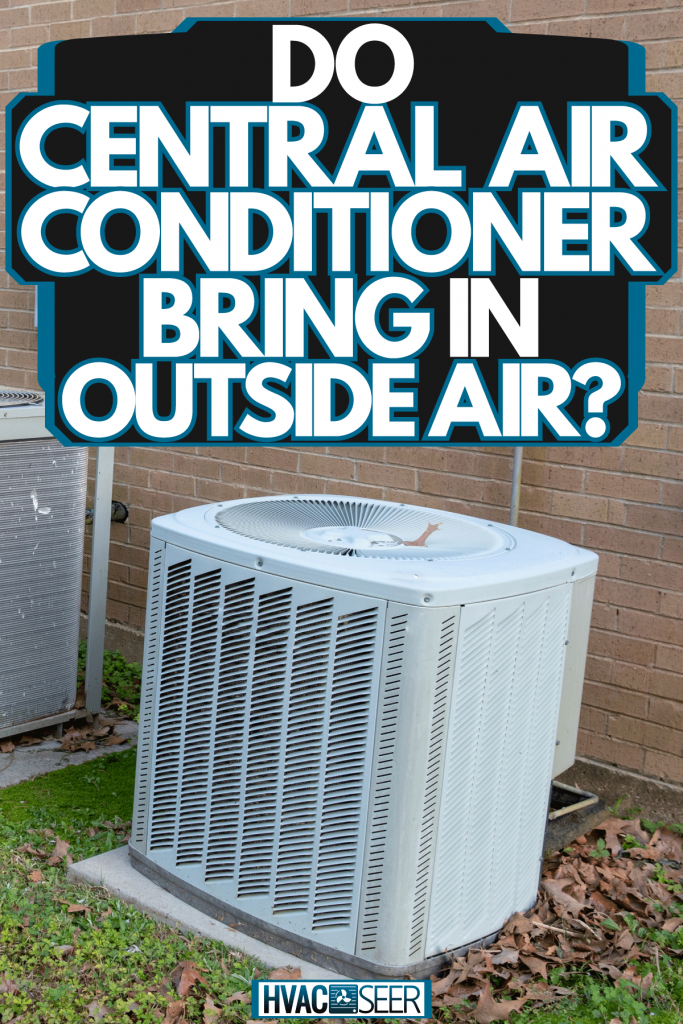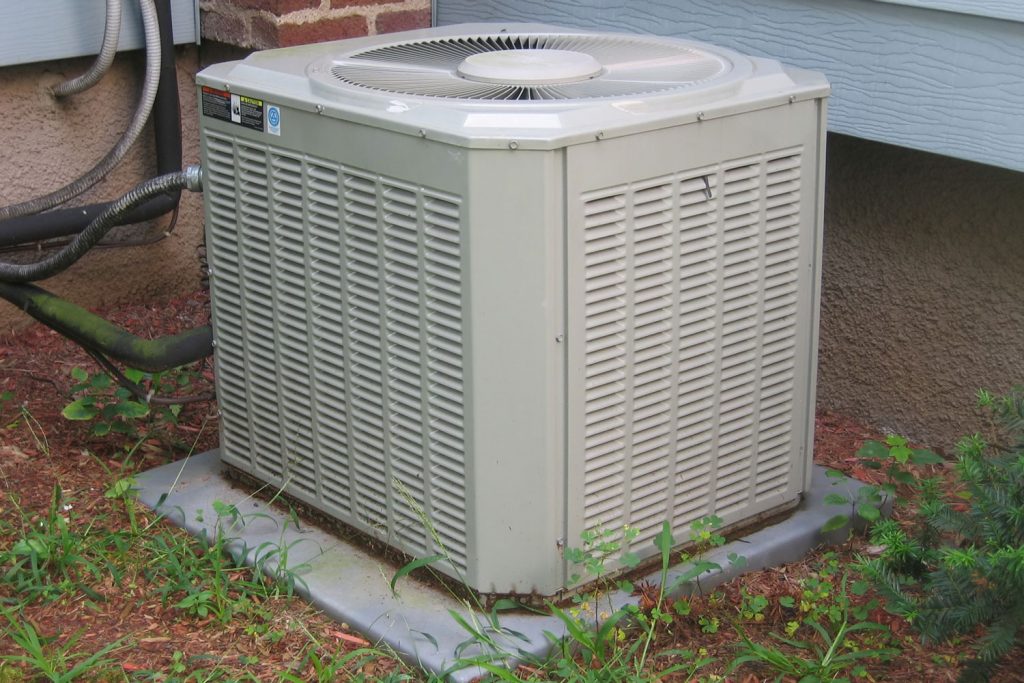Central air conditioners are great for keeping your home cool during the hot summer months. Perhaps your home has a central air conditioner, and you are wondering if it funnels air from outside into your home? Or if the central air conditioner recirculates air? These are excellent questions. We've done the research, and we have found definite answers to your questions.
No, central air conditioners do not draw outside air into the house. Instead, they remove the heat and humidity from the air in your home and release the cool air into the house through the duct system.
Are you interested in learning more about how central air conditioners work? Perhaps you are wondering if you could leave the fan on the auto setting or not? Or are you curious where the fresh air intake unit is on a central air conditioner? We hope you continue reading our post. We have researched this topic and have found a lot of helpful information to share with you!

Where does central AC get air from?
Central air conditioning units get their air supply from the indoor air in the home that is supplied to the AC unit by the duct system. The supply ducts are the openings within the houses' ceilings, floors, and walls covered by grills. These semi-covered openings allow the cool air to flow from the central AC unit through the house.
Once the cooled air is introduced to the home from the duct system, it is circulated through the house through the return duct systems back to the air conditioner. This AC cycle will continuously repeat to maintain the cooler temperatures inside.
Are you interested in where a window air conditioner draws air from? Read Does A Window Air Conditioner Pull Air From Outside?
Where is the fresh air intake on an air conditioner?
The fresh air intake placement on your air conditioner could vary based on the appliances manufacturer and your home's unique layout. Generally, the fresh air intake will be located inside your attic or ducted to the return side of your central air conditioning unit.
Suppose you are unsure where the fresh air intake is located. Check your central air conditioning owner's manual. Please don't hesitate to contact your HVAC service person for further assistance and details.
Moreover, you could close the fresh air intake to reduce the amount of fresh air allowed into the building. This feature could be especially crucial if there is a chemical spill or a wildfire in your area. Closing the fresh air intake will stop some of the pollutants from entering your HVAC system.

Why do air conditioners use outside air?
No, air conditioners do not use outside air. Although, when these systems are running, it does feel like the AC unit is dispersing cool outside air throughout the house. The central air conditioners do not use outside air to cool the home's interior. Instead, the AC unit will remove the humidity and warmth from the indoor air. Then, release cold filtered air via the houses' duct system.
Suppose the outdoor air is exceptionally smoky or polluted. Running the AC will keep some of those harmful pollutants out of your house. Also, most air conditioners have an air filter or two for air purification purposes, which are great for filtering the recirculated indoor air and will cut down on airborne germs and pollutants in your house.
Does central air recirculate?
Central air conditioners do recirculate the air in all buildings or homes. The duct system is installed to transport warm indoor air to the central air conditioner, where it is cooled by the machine and released to the supply ducts.
Although this process repeats several times per day depending on the seasons and indoor temperature settings, although the air is recirculated, it is cooled and filtered each time, which reduces the percentage of allergens and pollutants particles within the house's air supply.
Air conditioners are essential appliances for making the hot summer months comfortable. Maybe you are wondering how many different types of air conditioning units there are available? Read our article, 6 Types Of Air Conditioners, to learn more.
How do I set my central AC to recirculate air?
The central air conditioning unit will continuously recirculate air within your home when the AC system is on and actively cooling the house. You do not need to change any of the AC settings for the unit to recirculate the cool air.
As mentioned earlier in this post, the central air conditioning units and the duct systems are engineered and installed to recirculate indoor air safely with air filters to reduce indoor air toxicity.
Suppose you are concerned with air circulation in the windowless rooms in your home? Read about it here: How To Improve Air Circulation In A Room Without Windows.
Should my AC fan be on auto or on?
The experts at Cool Today state choosing to use the fan auto setting is better for the AC system and your energy bills. However, you know your home and your temperature requirements best. Before you decide to use the auto setting or leave the AC fan on continuously. Please read the following pros and cons to make an informed choice.
Pros and cons for the auto setting
Pros: the auto setting is eco and budget-friendly because the fan will only turn on when the air conditioning actively cools the house. Once the set temperature on the thermostat is reached, then, the fan will shut off until it is time to start circulating the cool air again.
Cons: the indoor air won't be as clean because the fan will only be circulating air through the home when the AC is working to lower the house's temperature. Suppose you or your loved ones have respiratory issues. This is not the best setting to improve your home's air quality.
Pros and cons for the on setting
The pros: leaving the fan on continuously will constantly move the air and force it through the AC unit's air filtration. For those with respiratory issues, this is a good option for added indoor air purification. Many who suffer from allergies and asthma will need the AC fan on continually during the summer months to reduce the pollen and pollutants in the air that trigger respiratory attacks.
The cons: suppose you leave the fan on continuously. Your energy bills will be significantly higher from the fans' constant energy usage. Also, the AC unit will need repairs and filter changes more frequently because the fan is never idle, which will cause the fan and other components of the central air conditioning unit to wear down much quicker than with the auto fan setting.
Another common issue is that the AC will remove less humidity from the indoor air. Because the fan is constantly funneling the air through the ducts and the air conditioning unit, the water from the moisture in the air does not get time to evaporate between cooling cycles, which will increase the humidity in the home significantly.
Moreover, the risk of mold growth increases with high indoor humidity levels. Mold growth in residential settings can be deadly to homeowners' or tenants' overall health.
Food for thought
Therefore, it is imperative to remember that you could change the air conditioners' fan setting. Based on the seasonal weather and temperature needs of your household. Every month during the warmer seasons is somewhat different because of the varying air quality levels, humidity, and temperatures. Adjusting your AC fan setting to the current weather could be your best bet for maintaining a cool home.
In closing
The ongoing efforts to maintain a cool home during the heat of the summer months can be challenging; hence, why a central air conditioning unit is a vital part of your home's comfort and air quality! We sincerely hope this article was helpful to you for learning more about air conditioners and how they work. Please visit www.hvacseer.com soon for more helpful cooling and heating content!
Please, be sure to check out some of our other posts for further HVAC information and inspiration!
Ductless Air Conditioning Not Cooling – What Could Be Wrong?
Does A Window Air Conditioner Have To Be In A Window?
Should You Air Condition Your Garage? [Pros, Cons And How To]
